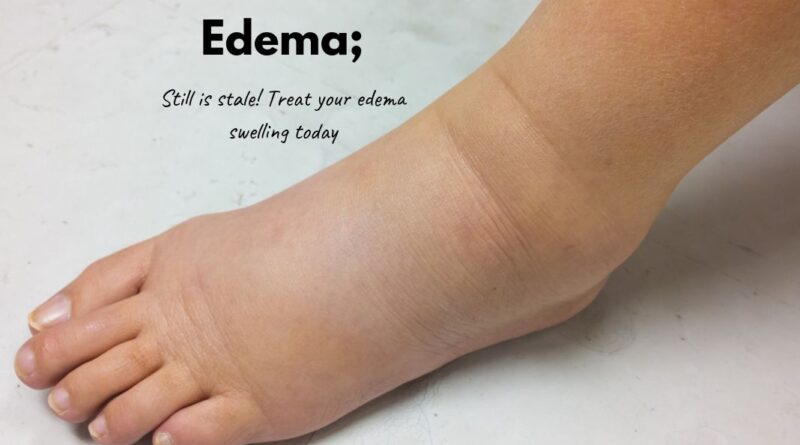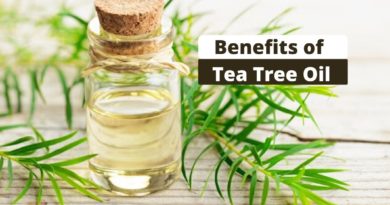How to Treat Edema Naturally?
Edema or fluid retention is the swelling caused in various parts of the body due to the abnormal fluid accumulation in the interstitial tissues. It causes great discomfort due to the swelling and stretching of the skin.
While edema is mostly seen in legs and feet, it can also affect other body parts like face, arms, hands, and abdomen. In some cases, it may even go unnoticed.
The most common cause of swollen legs and feet in individuals over the age of 50 is chronic venous insufficiency (CVI), which affects nearly 30%(1) of the general population. Also, women below the age of 50 are more at risk of developing cyclic edema (idiopathic edema).
Table of Contents
Naturopathic Remedies for Edema
- Foods
- Essential Oils
- Home Remedies
- Herbs
- Lifestyle
- FAQs
Causes of Edema
There are a number of reasons that may lead to edema. Some of them are:
- Pregnancy: It is by far, the most well-known case of edema wherein a pregnant woman has swollen legs and feet.
- Triggered allergies: Edema could be a response to an allergic reaction, such as an insect’s sting.
- Side effect of medicines: Certain medicines cause salt retention in parts of the body, leading to edema.
- Underlying disease: Edema could be a symptom of some medical condition such as the illness of the heart or the liver(2).
- Deficiency of proteins (such as albumin): The lack of albumin causes hypoalbuminemia, which causes edema(3).
- Clotting: Clotting obstructs the flow of fluids within the body, which leads to edema.
- Head trauma or injury: Any kind of trauma to the head causes a blockage in the cerebral fluid drain, which may also result in edema.
Signs and Symptoms of Edema
Some of the common symptoms of edema include pain, tenderness, swelling, and skin tightness. Edema can be tested through pitting, where you press the area and check for the time required for the skin to rebound. Apart from these generalized indicators, the other symptoms include:
- Puffy skin around the affected area.
- Stretched or shiny skin.
- Joint stiffness.
- Pressing the affected region leaves behind dimples in the skin.
- Visible veins in the limbs or neck.
- High blood pressure.
- Abdominal pain.
- Nausea.
- Fatigue.
- Blurred vision.
How to Treat Edema
Normally, mild edema can be easily treated at home. However, if the symptoms are too severe, then you must seek medical help immediately. In the case of diabetic patients, edema could result in something graver. Thus, be mindful of self-treating when medical opinion may be necessary.
CURE 1: Foods for Edema
Following are some beverages and food items that you can consume to alleviate the symptoms:
1. Green Tea
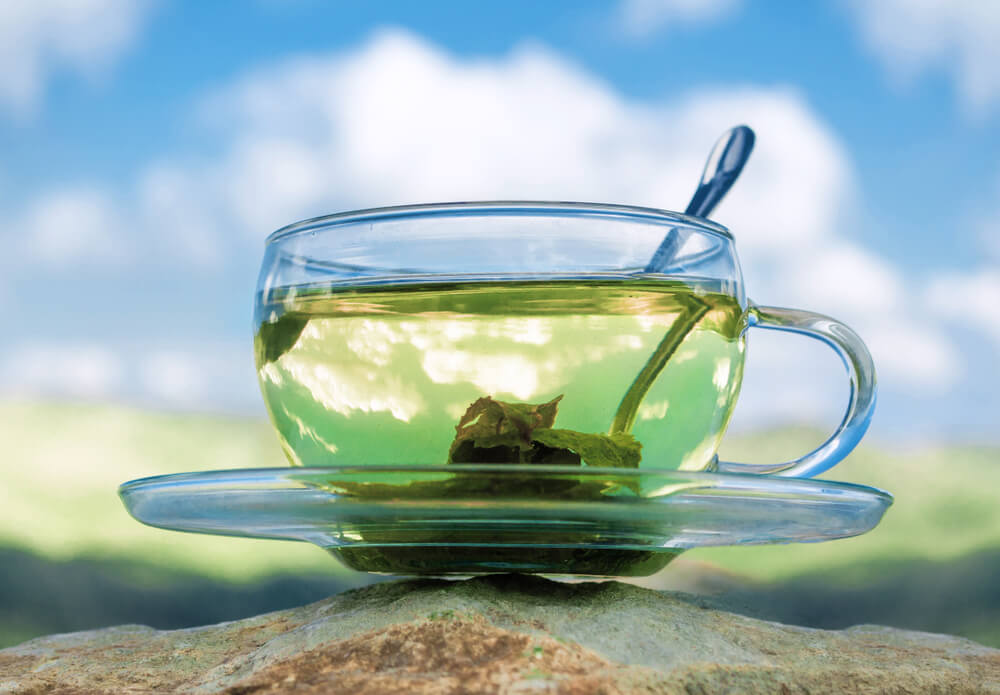
Green tea is turning out to be a restorative element for a long list of diseases and ailments. Loaded with antioxidants and bioactive compounds(4), regular consumption of green tea will greatly contribute to overall health.
Why Is It Effective?
Green tea is a diuretic, which means that it stimulates the production of urine in the body. The excess fluids available in the body will get metabolized and the toxins present in the body will be flushed out. The collective action of green tea will help in getting rid of edema.
How to Use It?
Bring a cup of water to boil and add a teaspoon of green tea leaves (you can even substitute it with a teaspoon of green tea extract). Allow the tea to steep for nearly 3-4 minutes. Strain out the water and consume it immediately. If required, you can add a sweetener such as honey for an enhanced flavor.
Quantity and Frequency of Usage
Have 2-3 cups of green tea daily.
2. Cranberry Juice
Having ties to blueberries, cranberries are packed with nutrients as most water-harvested fruits. Cranberries have a sharp, sour, acidic taste, which is why they are mostly consumed in its juice form, which is also blended with other fruit juices. For treating edema, unsweetened cranberry juice is helpful.
Why Is It Effective?
Cranberries are loaded with minerals like potassium and calcium, which help decrease water retention(5). Additionally, cranberry juice also has diuretic effects on the body, which flushes out the excess fluids.
How to Use It?
Have a cup of unsweetened cranberry juice in a day.
Quantity and Frequency of Usage
One cup a day of the juice is enough.
3. Turmeric Milk
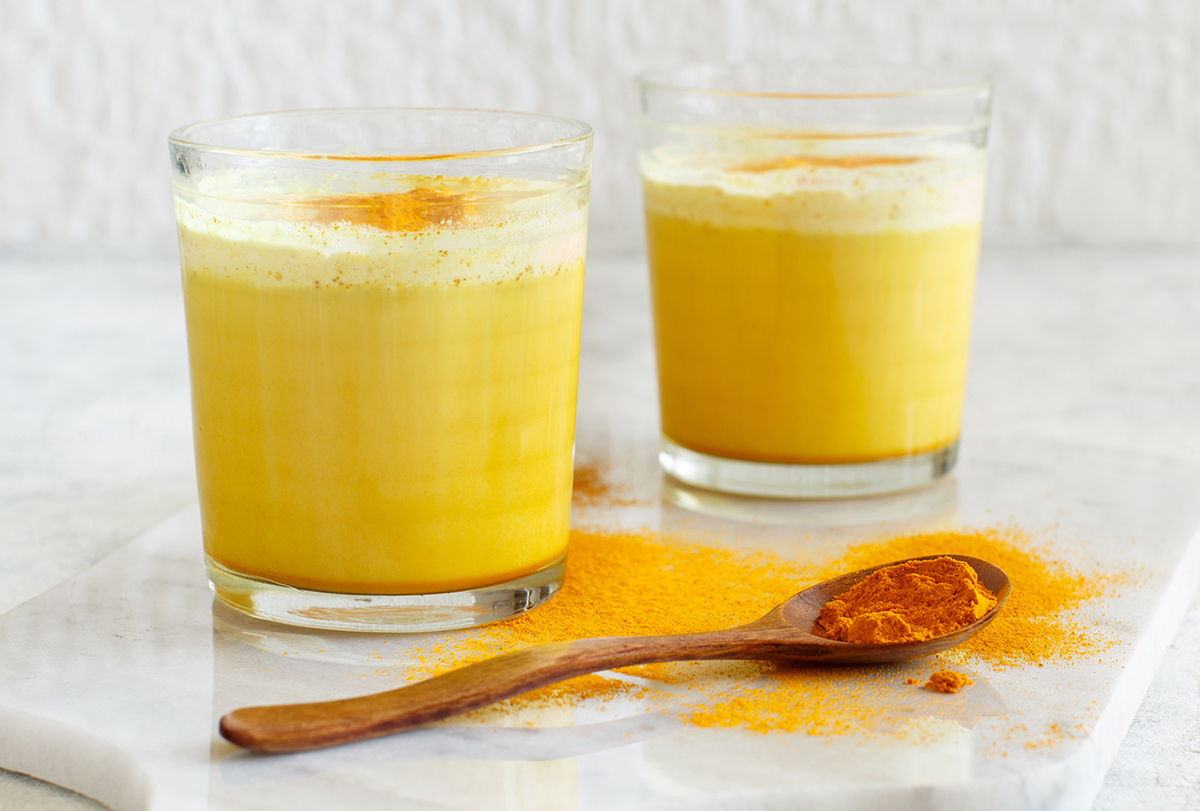
Also known as golden milk, turmeric milk is no stranger to curing diseases. When spiced with cinnamon and ginger, turmeric milk can target other health issues as well.
Why Is It Effective?
Turmeric contains curcumin, an active compound that has strong antioxidizing capabilities(6). In fact, the antioxidant properties are as potent as pharmaceutical drugs minus the side effects. Curcumin also helps in detoxifying the body, thereby reducing any swelling caused by edema.
How to Use It?
Mix one teaspoon of turmeric powder to a glass of warm milk. Give it a stir and consume it. You can mix some cinnamon and ginger for an added anti-inflammatory boost and some honey for flavor.
Another way to utilize turmeric is by mixing it with water to form a paste that can be topically applied.
Quantity and Frequency of Usage
Try out this remedy twice a day until edema is cured.
4. Flaxseeds
Flaxseed may have been tagged as a superfood most recently, but it has been a superfood for centuries. It contains lignans, a group of nutrients that are said to counter cancer, especially cancers of the breast and prostate.
Why Is It Effective?
Flaxseeds are a great source of alpha-linolenic acid (ALA) and omega-3 fatty acid, both of which cannot be synthesized by the body. ALA and Omega-3 fatty acids(7) help in eliminating wastes from the body. They also ensure the optimum functioning of the organs. Flax seeds attack the main cause of edema and act as a preventive and curative remedy.
How to Use It?
You can consume a teaspoon of roasted flax seeds. Alternatively, you can mix one teaspoon of crushed flax seeds into a glass of tepid water. Stir it in and drink the concoction immediately.
Quantity and Frequency of Usage
Have 2 teaspoons of flaxseed divided into 1-1 teaspoon twice a day.
TIP: If you are not regular with the consumption of flaxseed, you can incorporate them in your flour, salads, and other meals.
5. Dandelion Tea
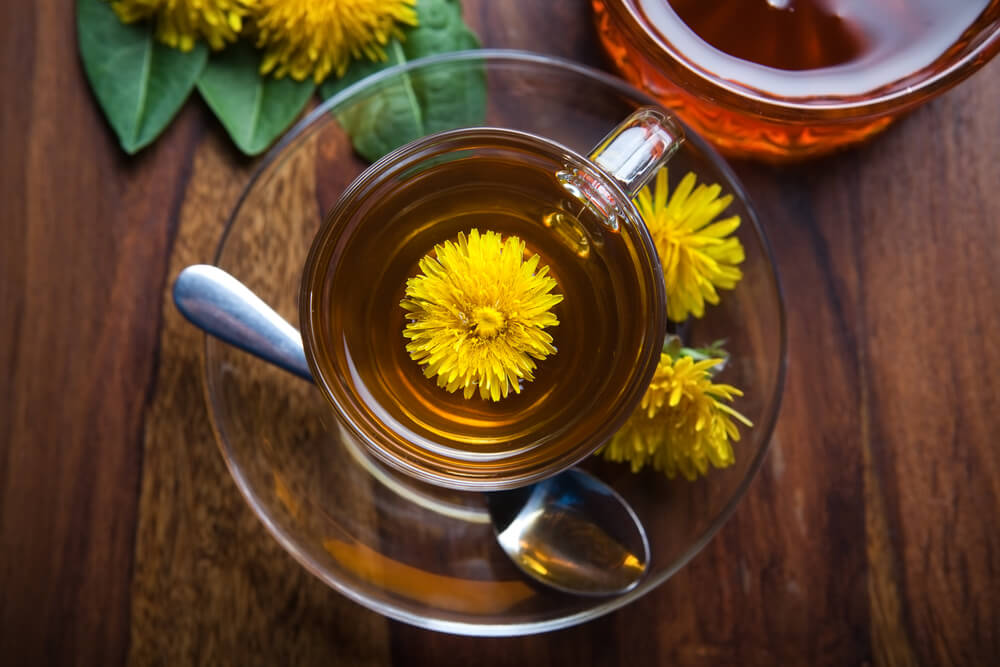
Gardeners may think of dandelion as a weed but practitioners of alternative medicine wax lyrical about it for its medicinal value. Dandelion tea can be prepared in two ways, by infusing the dandelion leaves in warm water, and by tea made from the roasted roots of the plant.
Why Is It Effective?
Dandelion is a natural antioxidant and diuretic. A recent study(8) suggested that merely two single cup servings of dandelion tea (made from leaves) increased the urine output considerably. Hence, consumption of dandelion tea can help in containing the fluid retention that results in edema.
How to Use It?
Dandelion Tea from Extract
In boiling water, add some dandelion extract as instructed in the packaging. Strain the liquid and let it cool. You may flavor this tea with some honey or sweetener of your choice.
Dandelion Tea from Fresh Flowers and Leaves
Wash the leaves and flowers thoroughly. Bring water to a boil and then turn off the heat. Add leaves and flowers in the hot water and let it be for around 15 to 20 minutes. Strain the tea, allow it to cool, and consume it.
Dandelion Tea from Roots
Clean the dandelion roots thoroughly. Chop them into small pieces and pop them in the oven over high heat for nearly 2 hours. Add 1 or 2 teaspoons of the roasted roots to some hot water and allow it to remain there for 10 minutes. Strain the mixture and let it cool before consuming it.
Quantity and Frequency of Usage
If the dandelion plant has not been treated with pesticides or herbicides, dandelion tea is fit for regular consumption. Drink dandelion tea about twice a day to enjoy its benefits.
TIP: Certain people are allergic to dandelions. Before consuming dandelion tea, ensure that you do not have any allergies to the plant.
6. Parsley Leaves
Parsley leaves are known to relieve the symptoms of arthritis, prevent osteoporosis, and also help manage diabetes. However, they gained further prominence when anticancer properties were discovered in this magic herb. Rich with vitamins and antioxidants, it is quite beneficial for general well-being.
Why Is It Effective?
Parsley is one of the most potent natural diuretics. The antioxidants and vitamins present in parsley allow the kidney to carry out self-cleansing activities(9). Additionally, parsley leaves also contain anti-inflammatory properties that have been used since centuries to treat insect bites, bruises, and aches. Just a few teaspoons of parsley juice is enough to offer quick relief from edema(10).
How to Use It?
Parsley leaves can be juiced or had as tea.
Parsley as Tea from Fresh Leaves
Chop 1 cup (60g) of parsley leaves as fine as possible. Bring one liter of water to boil and add the parsley leaves. Allow the tea to steep for 5 to 10 minutes. Strain the tea and consume it hot. You can flavor it with sugar, honey, or lemon.
Parsley as Tea from Dried Leaves
Add two tablespoons (approximately, 1 gram) of dried parsley to the bottom of your cup. Pour boiling water over the leaves and let it steep for about 8-10 minutes. Pass the liquid through the mesh and flavor it with a sweetener (optional).
Parsley as Juice
Cut off the stems of the parsley using a sharp knife. Wash the bunch of parsley leaves. Blend it with water and you have your juice ready. You can also add other fruits and vegetables that complement the taste of parsley. You can pair items such as apples, cilantro, lemon, carrots, kale, ginger, and spinach with parsley to make a delicious beverage.
Quantity and Frequency of Usage
Parsley leaves, in the form of juice and tea, can be had daily or at regular intervals.
7. Ginger Tea
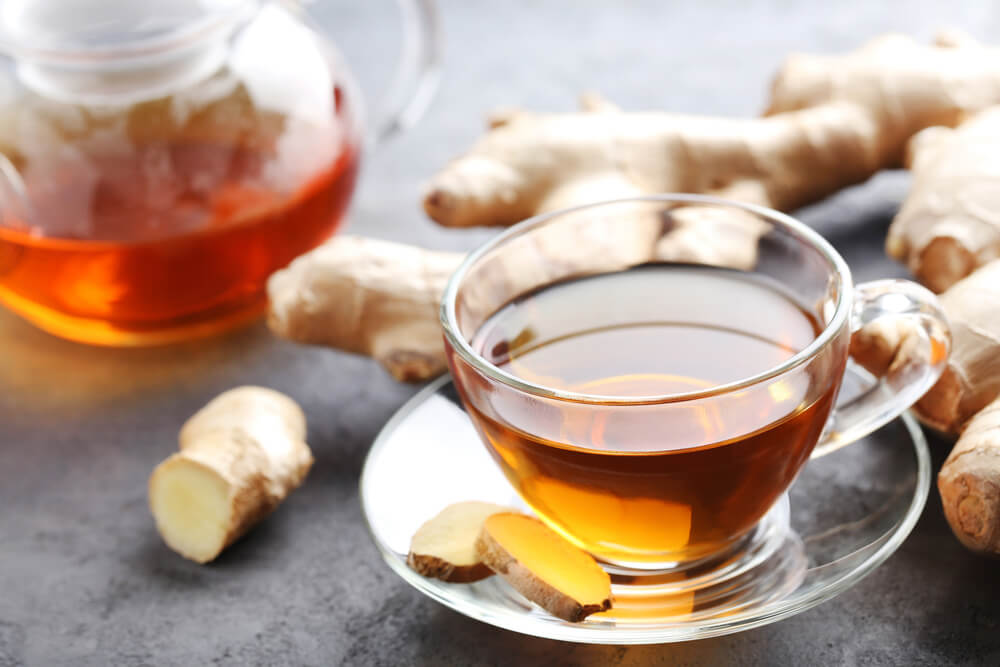
From treating cold and sniffles to relieving menstrual discomfort, there’s hardly anything that ginger tea cannot do. The spicy yet invigorating taste of ginger will relieve the pain and discomfort caused by edema.
Why Is It Effective?
Gingerol, an anti-inflammatory compound that carries medicinal qualities is responsible for giving ginger its healing properties. Ginger also contains analgesic properties. A natural diuretic, ginger is highly effective for treating swollen legs and feet as ginger tea dilutes sodium, the mineral responsible for swelling.
How to Use It?
Ginger Tea
Take an inch of ginger and peel it with the edge of a spoon. You can either grate it, crush it, or slice it thinly for use. Bring a cup of water to boil, add the ginger, and allow it to boil for a minute or two. Turn off the heat and let it steep for another 10 minutes. Strain the tea and consume it hot.
Dry Ginger Powder
To a cup of warm milk, mix a teaspoon of dried ginger powder. Stir it well. Add sugar or honey, if required.
Raw Ginger
Wash and peel an inch of ginger. Slice it into thin slivers. Chew on the raw slices of ginger. Alternatively, you can also simply let it sit in your mouth.
Ginger oil for edema
Ginger oil is as effective as regular ginger. Massage the affected portion with some ginger essential oil and it will soon start taking effect.
Quantity and Frequency of Usage
When consuming ginger tea or dried ginger milk, you can drink about 2-3 cups in a day. As for massage with ginger oil, do it four times in a day to alleviate the pain and to bring down the swelling.
TIP: If you find the taste of ginger to be overpowering, you can mask it by adding a few drops of peppermint, lemon, or honey to your tea.
Also Read: Health Benefits of Green Tea: Healthy Infusion
8. Coriander Seed Water
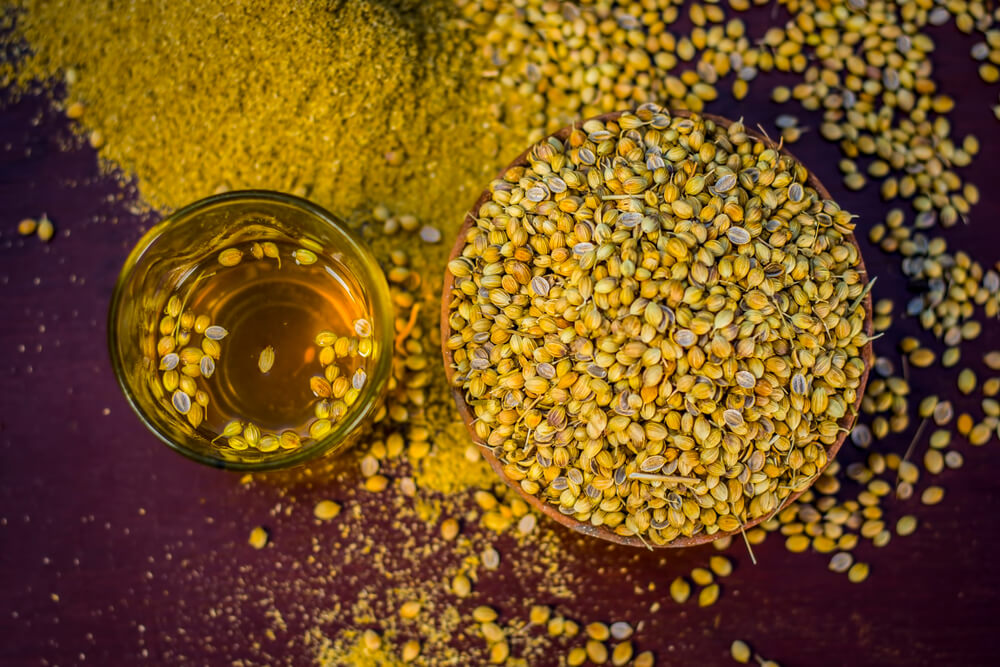
The fresh, aromatic, and invigorating infusion of coriander is often used for garnishing foods. On the other hand, the seeds of coriander are also used for spicing up cuisines. However, many individuals are unaware of the medicinal properties that it holds.
Why Is It Effective?
Coriander seeds contain high levels of potassium while also imparting anti-inflammatory properties(11). As a mineral, potassium is necessary for optimum renal and urinary tract health. Thus, the seeds of coriander will not only soothe the swelling and the pain associated with it but it will also help in flushing out toxins.
How to Use It?
Add 3 teaspoons of coriander seeds to a cup of water. Bring it to a boil and reduce it to half its volume. Let the mixture cool. Strain the seeds and drink the water immediately.
Quantity and Frequency of Usage
Consume this concoction at least twice in a day.
9. Sour Cherry Juice
Sour cherries are also known as tart, montmorency, and tart cherries. Unlike sweet cherries, sour cherries are often consumed in the dried or frozen form or as juice. However, take note that some variants of sour cherry juice contain high amounts of added sugar. Thus, to gain maximum health benefits from sour cherry juice, choose an unsweetened alternative.
Why Is It Effective?
Sour cherries are packed with antioxidants such as flavonoids that have great healing abilities(12). The antioxidants help in reducing inflammation and pain while also reducing swelling. A study conducted in 2004 drew links between regular consumption of cherries with a reduction in swelling and subsequent pain.
How to Use It?
Consume a glass of unsweetened sour cherry juice.
Quantity and Frequency of Usage
You should have about 240mL of tart cherry juice twice a day for full benefits. This quantity equals to about 200 tart cherries every day if you choose to consume it directly. If you are to make use of sour cherry juice powder, 480 mg per day is an adequate amount.
TIP: Sour cherry juice contains sorbitol, which is a sugar alcohol that may cause diarrhea or stomach cramps to some individuals.
CURE 2: Essential Oils for Edema
Essential oils are widely used in alternative medicine, primarily aromatherapy. These oils are said to be created from the extract of the plants. Processes involved in capturing the essence of the plan include distillation and cold pressing amongst others. Essential oils are not used directly. Rather, they are mixed with a carrier oil for topical and other uses.
1. Juniper Oil
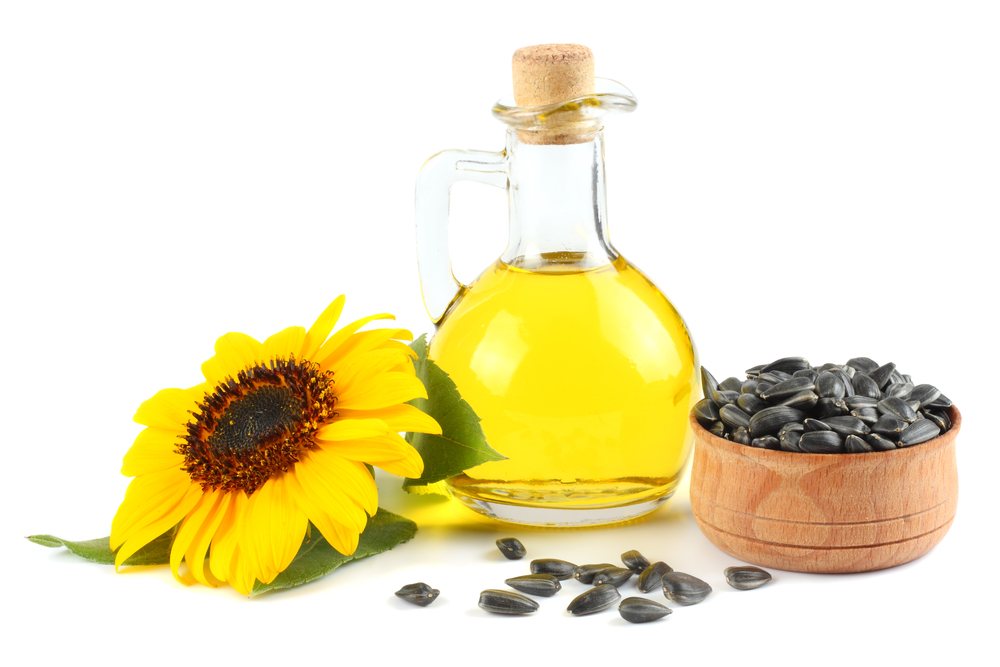
Juniper oil contains a wealth of properties(13) such as being antiseptic, antirheumatic, antispasmodic, astringent, diuretic, vulnerary, sudorific, depurative, stomachic, carminative, tonic, and rubefacient. Hence, it is only natural that it could take on a range of illnesses.
Why Is It Effective?
The key properties that make juniper oil effective against edema are the antirheumatic and its diuretic qualities. It can effectively reduce the pain and swelling when used topically. It reduces the uric acid content in the body and removes other toxins while improving circulation.
How to Use It?
Mix 6-7 drops of juniper oil to 30ml of carrier oil such as olive or coconut oil. Apply the resultant mixture on the affected areas.
Quantity and Frequency of Usage
To gain relief from symptoms of edema, apply the oil mixture twice a day.
2. Tea Tree Oil
From the tips of your hair to the ends of your nails, tea tree oil can serve a variety of purposes to grant you good health. A native plant of Australia, the Aborigines have greatly benefited from it for centuries before tea tree essential oil turned into a hot global trend.
Why Is It Effective?
Tea tree extracts are a natural analgesic containing high levels of anti-inflammatory compounds. It brings down swelling and relieves the pain. Interestingly, tea tree oil can also act against bug bites and reduce itching, swelling, and redness. As mentioned earlier, the release of histamines to an allergen may also cause edema, which tea tree oil can counter(14).
How to Use It?
Apply 4-5 drops of tea tree oil to a swab of clean cotton. Rub the cotton swab gently over the affected region.
Quantity and Frequency of Usage
Follow this routine twice a day to observe a noticeable improvement in the condition.
3. Oil of Oregano
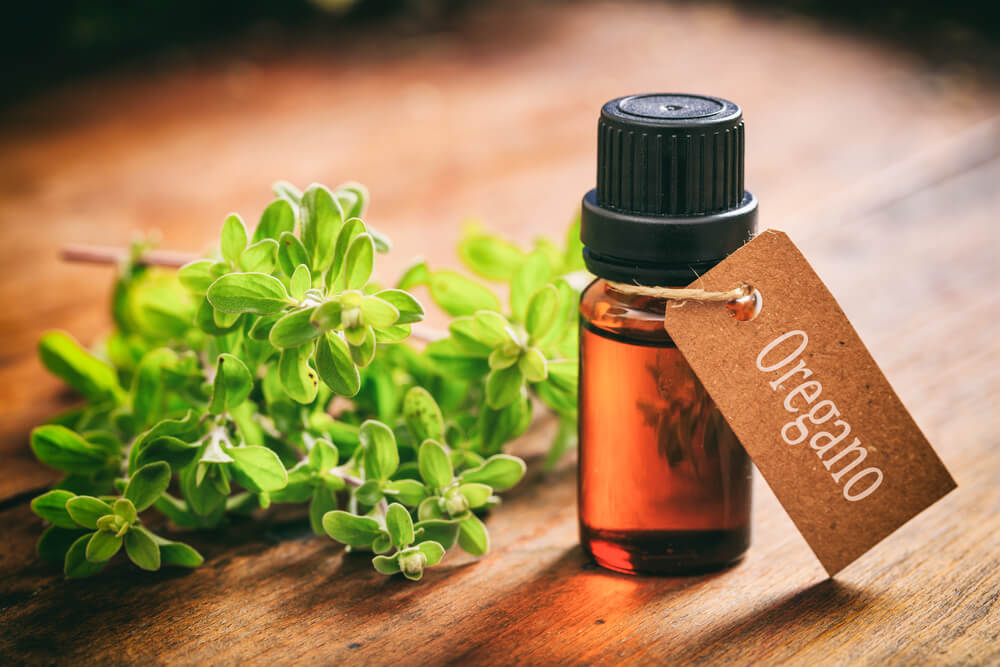
Oregano is much more than your seasoning for pizza and pasta. The popular herb is rich in antioxidants(15) and so is its oil.
Why Is It Effective?
Oregano oil acts against inflammation due to the presence of antioxidants. It also contains carvacrol, a compound that is responsible for bringing down swelling. In an animal study(16), it was found that carvacrol reduced the swelling of mice’s paw by 57%.
How to Use It?
Mix 5-6 drops of oregano oil with 30ml of carrier oil (either olive or almond oil) and massage it over the affected area.
Quantity and Frequency of Usage
For a quicker recovery, try doing this twice a day.
Also Read: Antiviral Herbs to Keep You Healthy
CURE 3: Home Remedies for Edema
Home remedies or folk medicines have been used since time immemorial. Such form of treatment makes use of items that are readily available around the house.
1. Massage Therapy with Warm Mustard Oil
Mustard oil has been widely used to ward off body pain and aches. The usage indicates that it has proven to be rather effective in dealing with inflammation.
Why Is It Effective?
Mustard oil is said to enhance the blood circulation, which decreases the pain caused by edema.
How to Use It?
Warm up ½ a cup of mustard oil. You can also add carom seeds to mustard oil. Apply it to the affected portion and gently massage it.
Quantity and Frequency of Usage
Practice mustard oil massage therapy at least twice a day.
2. Apple Cider Vinegar
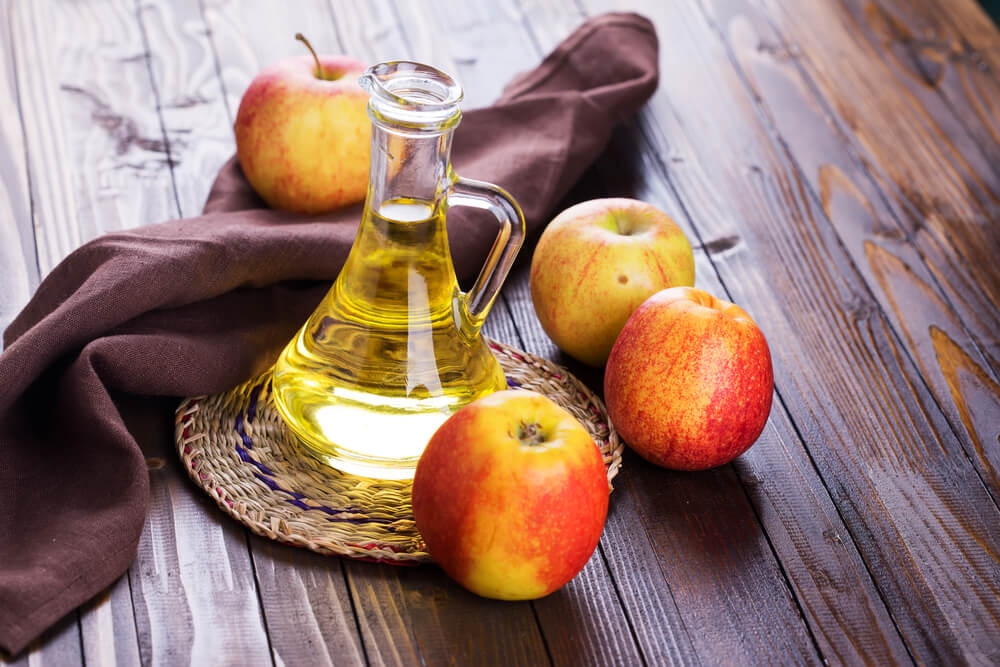
Apple cider vinegar (ACV) has broken out as a viral trend amongst those following natural treatments. From helping with weight loss to lowering blood sugar level, this wonder vinegar is really an end-all measure.
Why Is It Effective?
The high potassium content paired with the anti-inflammatory qualities(17) helps in tackling the issue of edema. Potassium decreases the fluid retaining capacity of the body while the anti-inflammatory compounds bring down swelling.
How to Use It?
Mix warm water and ACV in a ratio of 1:1. Dip a clear towel in this mixture and allow it to soak. Wrap the towel around the swollen and tender areas and let it rest for 5 minutes. Mix cold water and ACV in a ratio of 1:1 and follow the same process.
Frequency of usage
Follow this twice a day until the swelling subsides.
3. Hot and Cold Compress
Quite often, we make use of a hot or cold compress to treat sports injury or any other swelling or inflammation. Thus, it would naturally be helpful against edema too.
Why Is It Effective?
Hot Compress: Heat improves the local blood circulation to the area, which results in the reduction of pain and swelling.
Cold Compress: Applying a cold compress to the affected region numbs it and brings down the swelling and inflammation.
How to Use It?
Keep some warm and cold water in two separate containers. Soak a clean towel in warm water and wrap it around the swollen section. Let it rest in position for 5 minutes. Unwrap and dip the towel in cold water, then once again apply it over the swollen area. Repeat for a few times.
Frequency of usage
Follow this technique twice a day until the swelling disappears.
4. Epsom Salt for Edema
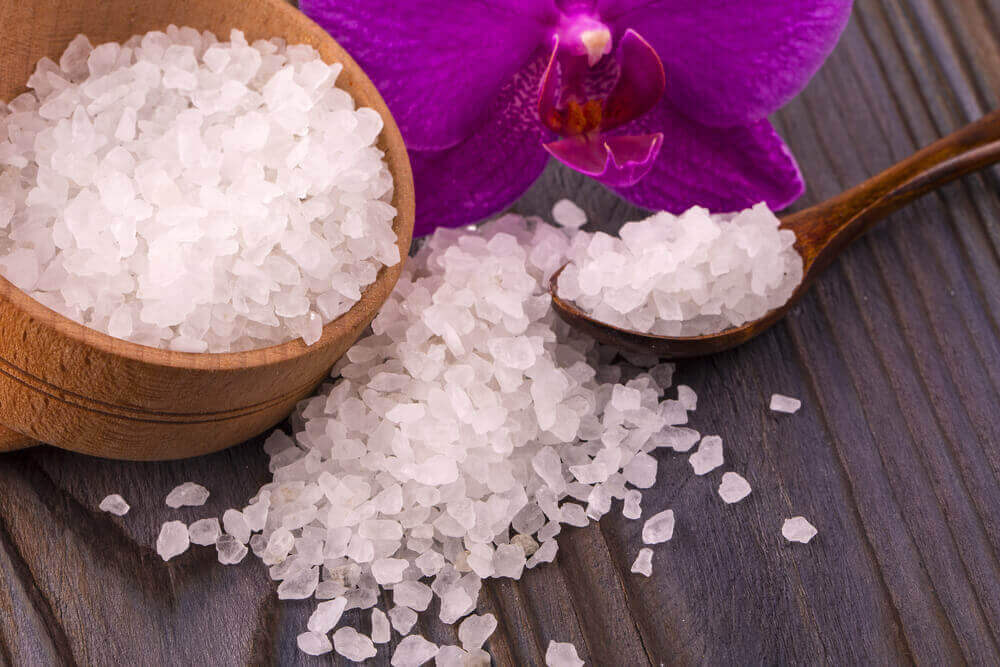
Epsom salt is used for muscle relaxation, de-stressing at the spa, and even gardening. The most important quality of Epsom salt is to put the body at comfort.
Why Is It Effective?
Epsom salt is primarily composed of magnesium sulfate, which is known to reduce inflammation and swelling due to its anti-inflammatory qualities.
How to Use It?
Epsom Salt Bath for the entire body: Add one cup of Epsom salt to your bathtub. Soak in the bathtub for nearly 15-20 minutes.
Epsom Salt Bath for swollen legs and feet: Add ½ a cup of Epsom salt to a bucket of warm water. Dip and soak your legs in it for 10-15 minutes.
Frequency of usage
Follow this regime once a day to observe a noticeable effect.
CURE 4: Herbs for Edema
Deficiency of certain minerals or compounds can also cause lead to diseases. Thus, supplements are the best way to make up for the lack of such elements.
1. Grape Seed Extract
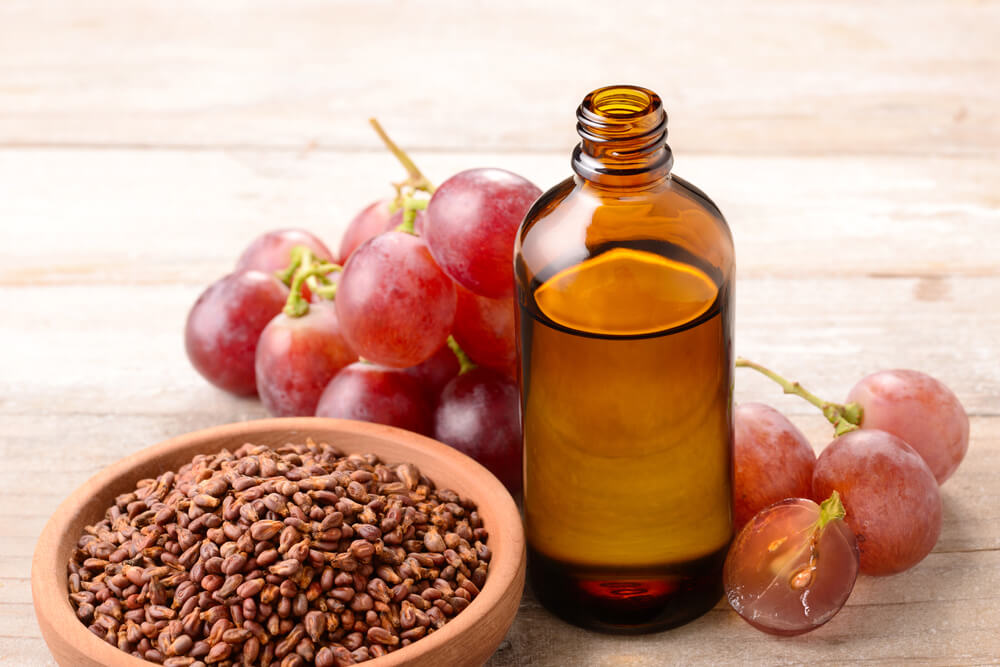
Grape seed extract is obtained by grinding the seeds of grapes used to make red wine. It has proven to be effective against cardiovascular diseases.
Why Is It Effective?
Grape seed supplement is particularly effective for those who suffer from edema due to chronic venous insufficiency. It reduces the discomfort(18) caused due to swollen legs and feet.
Dosage and frequency of usage
Consume grape seed extract supplement of 100mg twice a day.
2. Olive Oil Leaf Extract
While many individuals only know about the benefits of olive oil, the medicinal value of olive oil leaves may feel like a surprise. However, olive oil leaf has been used for treating bacterial and viral infections amongst other conditions.
Why Is It Effective?
The bioactive compounds present in olive oil leaves have antioxidant and anti-inflammatory abilities. Various studies have found olive oil leaf extract to be rather effective against brain edema.
Dosage and frequency of usage
Have a 500mg capsule of olive oil leaf extract once a day.
3. Celery Seed Extract
Those suffering from arthritis and gout consume celery for pain reduction. Thus, it comes as no surprise that celery seed extract also works against edema.
Why Is It Effective?
Celery is a natural diuretic that increases the flow of urine, thereby excreting all the toxins. It is known for decreasing fluid retention. The anti-inflammatory components of celery bring down swelling and the pain associated with it.
Dosage and frequency of usage
Consume about 250-500mg of celery seed extract once a day for relief from edema.
4. Horse Chestnut Seed Extract
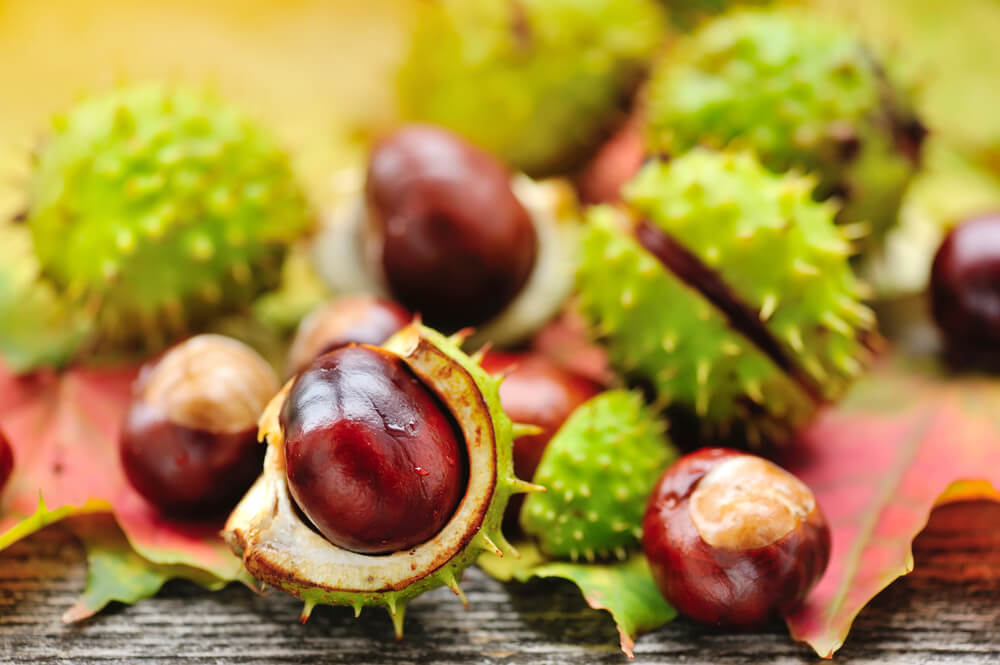
The seed, flower, leaves, and bark of the horse chestnut are widely used due to its various medicinal properties. Interestingly, horse chestnut contains high levels of esculin, which is a fatal poison.
Why Is It Effective?
Horse chestnut is an effective diuretic that will drain out the blood from its toxins and impurities. It also contains aescin compounds, which have anti-inflammatory properties. These properties tackle the symptoms of edema. The seed extract of horse chestnut can help in the treatment(19) of chronic venous insufficiency.
Dosage and frequency of usage
Have 200mg of horse chestnut seed extract supplement once a day for a quicker recovery.
CURE 5: Lifestyle and Dietary Changes
Lifestyle and dietary trends could also be a contributing factor towards Edema. Some changes that you can incorporate are:
- Consume less salt: Salt contains sodium, which increases water retention. Avoid processed foods as they contain high levels of salt.
- Increase magnesium intake: Magnesium reduces fluid retention so incorporate dark chocolate, nuts, green leafy vegetables, and whole grains in your diet.
- Body positioning: Correct body positioning helps in easing the symptoms of peripheral and pulmonary edema. In the case of pulmonary edema, consider elevating the head. Also, elevate the legs to reduce edema in the legs.
- Get active: Walk around or simply move around to prevent the build-up of fluid in your legs that can cause swelling.
- Drink more water and avoid smoking.
- Do not sit or stand in one place for more than 3 hours at a stretch.
- Use pillows or stools to elevate your arms, legs, or any other affected part of the body for about 30 minutes at least 3-4 times in a day. The part of the body should be raised slightly above the heart.
- Use compression garments such as a hose or sleeve to prevent the collection of fluids.
Edema is a rather common condition and can occur to anybody at any point in life. In fact, there is a strong possibility that you may have had edema without having realized it. In most cases, the symptoms and causes are quite minor, such as swelling caused by a bee’s sting.
It could be a sports injury that you didn’t pay much heed to. These situations are not that alarming since the symptoms disappear in a matter of a few minutes.
Also Read: How to have a healthy lifestyle?
Bottom Line
All the home remedies and natural treatment methods are detailed to soothe the inflammation, swelling, and discomfort brought upon as a byproduct of edema.
However, if you observe deep indentations in the affected region, a higher degree of pain, and other symptoms, especially those similar to breathing troubles and chest tightening, it is highly suggested that you seek immediate medical attention.
FAQs
This section addresses some of the frequently asked questions related to edema.
1. What to do for swollen feet?
All the home remedies and natural treatments to soothe swollen feet have been mentioned above. Depending on the availability of goods, you can choose the best way to treat it.
2. How long does it take for swelling to go down?
Depending on the type, cause, and condition of edema, it could last from a mere 30 minutes to 30 days. If despite the remedies and natural care, the symptoms still persist for more than a month, you should pay a visit to a physician.
3. What happens when Edema is untreated?
If Edema is left untreated, it can cause the development of chronic sores, skin ulcers, infections, and scarring between tissues. Edema can result in stiffness that drastically affects your mobility negatively and hampers with the quality of life. Additionally, it could also be a symptom of an underlying disease that can affect you adversely.

